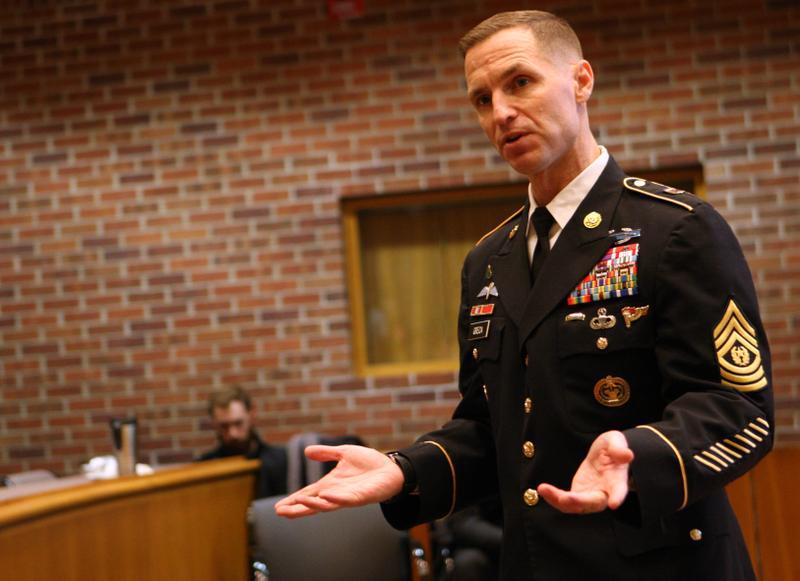A crowd filled the Hulston Hall courtroom on the afternoon of Jan. 22, where Command Sgt. Maj. Christopher Greca spoke in celebration of opening the MU Veterans Clinic.
Greca addressed several problems that American veterans face.
“We have some challenges out there that are internal to our Army right now,” Greca said. “We have suicides, unfortunately, happening way too much. We have health issues and high risk behaviors that we need to defeat.”
He added that such issues must be solved through awareness and reaching out to veterans.
“Awareness is key — knowing where your veterans reside in your communities and knowing how to look out for them,” Greca said. “Ladies and gentlemen, that’s what you do, and that’s what nonprofit organizations do.”
In addition, Greca said what veterans seek are not handouts but opportunities.
“They (veterans) all say the same thing: What they miss is the people, but what they _really_ miss is the team,” he said. “They say that there are Fortune 500 companies that haven’t figured out how to be a team. Service teaches the importance of your battle buddy and the importance of how you support one another for the goals of the organization you are working for.”
Professor Angela Drake, who organized Greca’s speech at the courtroom, said the Veterans Clinic will have the capacity to give valuable opportunities to student veterans.
“Several of our students who are veterans are in the clinic,” she said. “They are having an opportunity to help other veterans through their experiences at the clinic.”
Drake said she hopes that students at the clinic will someday graduate, and continue taking veterans’ cases as pro bono work at professional firms.
The clinic’s services, which are to help veterans appeal denied claims for benefits, are crucial to lending a hand to the servicemen and women, Drake added.
“The paperwork is overwhelming, the regulations are overwhelming, and it is a lot for someone who is not trained in legal matters to try and navigate the VA disability claim system,” she said.
During his lecture, Greca spoke of service and what it means for him.
“I was a kid without a lot of direction,” he said. “I think service helps you mature, helps you learn about responsibility, and it teaches you about courtesy and respect,”
It is through service that one learns about true sacrifice, Greca added.
“To a young 18 or 19 year old, a year is a lot. That’s truly what sacrifice is about,” he said. “I’ve had experiences in Iraq, Afghanistan and back here in the United States that would warm everybody’s hearts to hear, and I wish everybody could be exposed to what I’ve seen in a deployed capacity.”
Greca recalled awarding a Purple Heart to a wounded soldier, who had lost three limbs in combat.
“(Going into the medical facility,) we expected that due to the significance of his injuries, that this man would be unconscious,” he said. “But when we (arrived) this kid was wide awake. My boss told him that we are there to give him a Purple Heart and explain to him what happened to him. Missing three limbs, he sat up, surrenders a hand salute and says, ‘Sir, I would be honored.’ They (servicemen and women) are the reasons why I continue to serve and advocated for serving.














